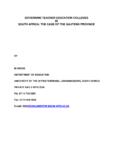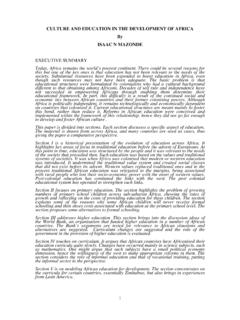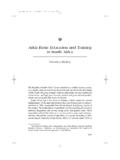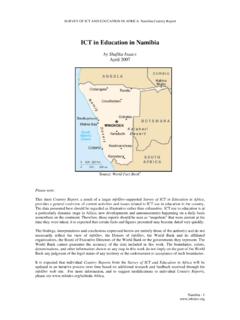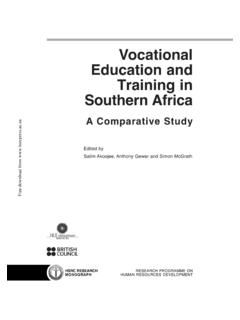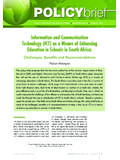Transcription of CONSTITUTIONAL COURT OF SOUTH AFRICA Case …
1 CONSTITUTIONAL COURT OF SOUTH AFRICA Case CCT 4/00 CHRISTIAN education SOUTH AFRICA Appellant versus MINISTER OF education Respondent Heard on : 4 May 2000 Decided on : 18 August 2000 JUDGMENT SACHS J: Introduction [1] The central question in this matter is: when Parliament enacted a law to prohibit corporal punishment in schools, did it violate the rights of parents of children in independent schools who, in line with their religious convictions, had consented to its use? [2] The issue was triggered by the passage of the SOUTH African Schools Act (the Schools SACHS J Act) in 1996,1 section 10 of which provides: Prohibition of corporal punishment (1) No person may administer corporal punishment at a school to a learner.
2 (2) Any person who contravenes subsection (1) is guilty of an offence and liable on conviction to a sentence which could be imposed for assault. The appellant, a voluntary association, is an umbrella body of 196 independent Christian schools in SOUTH AFRICA with a total of approximately 14 500 pupils. Its parent body was originally established in the USA to promote evangelical Christian education and the appellant has been operating in SOUTH AFRICA since 1983. It says that its member schools maintain an active Christian ethos and seek to provide to their learners an environment that is in keeping with their Christian faith. They aver that corporal correction the term they use for corporal punishment is an integral part of this ethos and that the blanket prohibition of its use in its schools invades their individual, parental and community rights freely to practise their religion.
3 1 Act 84 of 1996 2 SACHS J [3] When the Schools Act was being debated in Parliament, the appellant made submissions to the effect that the prohibition of corporal punishment violated its rights to freedom of religion and cultural life, as guaranteed in the then applicable interim Constitution, but it failed to secure an exemption from the prohibition for its schools.
4 After the Schools Act was adopted, the appellant sought direct access to this Court2 for an order challenging its constitutionality. This application was refused on procedural The appellant then applied to the SOUTH -Eastern Cape Local Division of the High COURT for an order declaring section 10 of the Schools Act unconstitutional and invalid in that it interferes with the right to freedom of religion and to cultural life to the extent that it prohibits corporal punishment in those independent schools. In the alternative the appellant sought to have section 10 declared unconstitutional and invalid to the extent that it prohibits corporal punishment in independent schools where parents have consented to its application. The appellant eventually abandoned its first claim and relied solely on the alternative claim.
5 [4] The appellant cited the following verses in the Bible as requiring its community members to use corporal correction : Proverbs 22:6 Train up a child in the way it should go and when he is old he will not depart from it. Proverbs 22:15 2 In terms of section 167(6)(a) of the Constitution and section 16 of the CONSTITUTIONAL COURT Complementary Act, 13 of 1995, read with rule 17 of the CONSTITUTIONAL COURT Rules. 3 Christian education SOUTH AFRICA v Minister of education 1999 (2) SA 83 (CC); 1998 (12) BCLR 1449 (CC). 3 SACHS J Foolishness is bound in the heart of a child, but the rod of correction shall drive it far from him.
6 Proverbs 19:18 Chasten thy son while there is hope and let not thy soul spare for his crying. Proverbs 23:13 and 14 Do not withhold discipline from a child, if you punish with a rod he will not die. Punish him with a rod and save his soul from death. In support of its contention that parents have a divinely imposed responsibility for the training and upbringing of their children, the appellant cites Deuteronomy 6:4 to 7: Hear, O-Israel! The Lord is our God, the Lord is one! And you shall love the Lord your God with all your heart and with all your soul and with all your might. And these words which I am commanding you today, shall be on your heart; and you shall teach them diligently to your sons and shall talk of them when you sit in your house and when you walk by the way and when you lie down and when you rise up.
7 It contends that corporal punishment is a vital aspect of Christian religion and that it is applied in the light of its biblical context using biblical guidelines which impose a responsibility on parents for the training of their children. [5] It has further claimed that according to the Christian faith, parents continue to comply with their biblical responsibility by delegating their authority to punish their children to the teachers. By signing a document entitled Consent to Corporal Punishment , they indicate that they understand corporal punishment to be inseparable from their understanding of their 4 SACHS J Christian faith and an expression of their religion.
8 They further acknowledge that if they do not wish a child of theirs to be subjected to corporal punishment they are at liberty to remove such child from the school; otherwise they authorise the school to apply corporal correction. The correctional procedure to be followed includes giving the parents themselves the option to apply corporal punishment should they so wish. Should such option not be exercised, the correction is to be applied in the form of five strokes given by the principal, or a person delegated by him, with a cane, ruler, strap or 4 The prescribed procedure is set out in the appellant s affidavit as follows: (a) Know the offence. Investigate and get the facts. The child must deserve the punishment. Know without a doubt that it was intentional not careless.
9 (b) Get a witness. Men give hidings to boys, ladies to girls and the witness should be the same sex as the child. (c) Discuss the offence. The child must know exactly what they did and why they are being punished. Give them the benefit of any doubt. (d) Get an admission. The child should admit to doing wrong. If you know the offence and the child will not admit it, he [sic] is dishonest and this compounds the offence. (e) Identify the biblical principle that has been violated. Identify a principle from scripture that has been violated by the child s behaviour. (f) Position the child, have them lean forward with feet spread apart. Put their hands on the desk. You want them to be stationery [sic]. You don t want to hurt the child. Discipline is one thing, damage is another. (g) Review the offence, discuss the seriousness of the offence and the objective in building character.
10 5 SACHS J (h) Love the child, smile and tell them that you love them. (i) Pray with the child and have the child pray first and ask for forgiveness then [sic] you pray for the child and for his/her growth. (j) Men should hug boys and ladies should hug the girls. Reaffirm your relationship with that child.











